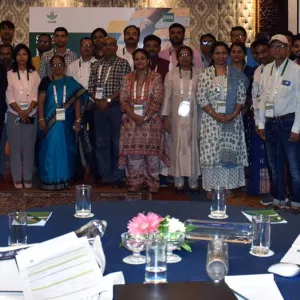CGIAR and IRRI ramp up Seed Equal Initiative in South Asia with rice seed workshops for India, Bangladesh, and Nepal
The new CGIAR Initiative Seed Equal- Delivering Genetic Gains to Farmers Fields is accelerating its engagement with rice sector stakeholders and rice farmers in South Asia with various consultations, visits, and workshops. Organized with the International Rice Research Institute (IRRI), these activities were conducted by the Seed Equal Work Package 4 team in collaboration with Work Package 1 and Work

CGIAR and IRRI ramp up Seed Equal Initiative in South Asia with rice seed workshops for India, Bangladesh, and Nepal
The new CGIAR Initiative Seed Equal- Delivering Genetic Gains to Farmers Fields is accelerating its engagement with rice sector stakeholders and rice farmers in South Asia with various consultations, visits, and workshops. Organized with the International Rice Research Institute (IRRI), these activities were conducted by the Seed Equal Work Package 4 team in collaboration with Work Package 1 and Work Package 6 teams from IRRI, in collaboration with premier rice research organizations such as the Indian Institute for Rice Research (IIRR), to share, build, and establish capacity among stakeholders to implement rice-based seed system best practices in a sustainable manner among farmers in India, Bangladesh, and Nepal.
High-quality seeds and improved seed varieties are among the most important inputs farmers can make to enhance crop yield, resilience, and profitability, contributing to regional food and nutrition security. This new global initiative aims to support the seed delivery to farmers of high-quality, climate-resilient, market-preferred, and nutritious varieties of priority crops, while ensuring equitable access for women and other disadvantaged groups. The Initiative promotes improvement in seed systems and value chains as an effective method to distribute genetic gains for yield, reduce adverse environmental stresses and pests and diseases, and support national seed systems.
Activities for South Asia began with a pre-workshop planning session held at the IRRI New Delhi office in May 2022. The purpose of this session was to plan the workshops to be launched in India, Bangladesh, and Nepal, to discuss the aspects of rice seed systems in these countries which need to be addressed. Subsequent meetings and consultations were also held at IRRI offices in Varanasi and Hyderabad, and at the IIRR office, to design the workshops with input from scientists, leaders, seed system actors, farmers, and other stakeholders.
The Seed…

